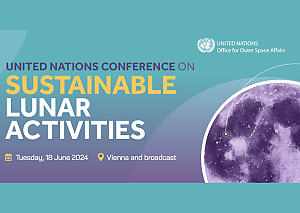United Nations Conference: Sustainable Lunar Activities
Organizer
United Nations Office for Outer Space Affairs
Content Description

In 1969, 650 million people watched the first moon landing live. While that was a unique event, moon missions are no longer such a rare occurrence. Since the start of the space age in the 1950s, there have been more than 77 successful lunar missions. This number is expected to increase tremendously over the next few years with more crewed landings, soft landings, and sample return missions, amongst others, planned for the future by both public and private entities. Against this background we are confronted with the inevitable question of how to ensure such activities are conducted in a safe and sustainable manner.
Since its inception, the intergovernmental Committee on the Peaceful Uses of Outer Space (COPUOS) has continued to develop global governance of outer space affairs. It has built international consensus in the peaceful uses of outer space, so upholding the fundamental principle of the Outer Space Treaty, which recalls that "the exploration and use of outer space, including the Moon and other celestial bodies, shall be carried out for the benefits and in the interests of all countries".
In a quest to maintain this essential spirit of the Treaty, COPUOS has seen different initiatives addressing aspects of lunar operations. This includes the Working Group on the Legal Aspects of Space Resources, and a more recent proposal to establish an Action Team on Lunar Activities Consultation (ATLAC).
Leading the multilateral dialogue on international lunar collaboration and governance , the United Nations Conference on Sustainable Lunar Activities aims to support Member States by convening heads of space agencies, scientific and legal experts, and relevant stakeholders from both the public and private sector, to understand the common approaches, complexities, and challenges to lunar activities, as well as identify possible avenues for global coordination, which is a prerequisite for sustainable, future lunar activities.
Program
Draft Program
Time (Central European Time) Session
- 09:00 Registration opens
- 10:00 Welcome and opening thoughts
by Aarti Holla-Maini, Director, UNOOSA - 10:15 Session 1: Coordination and Communication of Sustainable Lunar Activities
Ensuring safe and peaceful lunar operations will depend on robust communication and coordination by the countries that are conducting activities in orbit and on the lunar surface. This panel and the ensuing discussion will explore how to develop and support such a system and what role UNOOSA and the UN can play as a facilitating organization. - 11:15 Coffee break
- 11:45 Session 2: Commercial Activities / Perspective on Lunar Coordination and Communication
Public-Private Partnerships and commercial space companies generally are playing an increasingly important role in lunar exploration and development. This panel will explore perspectives of leading private sector companies on how best to implement coordination and communication to ensure safe and successful lunar operations. - 12:45 Lunch
- 14:00 Session 3: Future Lunar Activities and Approaches (Part I)
During this panel, we will hear from signatories to the Artemis Accords and the International Lunar Research Station (ILRS) programme, as to why these initiatives came into being, what the goals and ambitions of various signatories are, and how they support standards of behaviour that will lead to a peaceful and prosperous future in space for all of humanity to enjoy. - 15:00 Coffee break
- 15:15 Session 4: Future Lunar Activities and Approaches (Part II)
During this panel, we will continue to hear from signatories of the Artemis Accords and the ILRS programme about their goals and ambitions, and how they support standards of behaviour that will lead to a peaceful and prosperous future in space. - 16:15 Session 5: Workshop Discussion to Identify Common Areas of Agreement on Standards of Behaviour
Moderator: Aarti Holla-Maini
Leveraging the information presented in the previous two sessions, this final discussion will strive to identify common ground relative to standards of behaviour for lunar activities, including legal and regulatory aspects, that all parties can support. - 17:30 - 18:00 Closing remarks
- 18:30 Reception
Target Audience
The conference is for everyone interested in the long term sustainability of lunar activities.
The conference is aimed at experts and policymakers from regional, national and local institutions, private organizations, academic institutions, non-governmental organizations and international organizations from both developed and developing countries.
Representatives from the various permanent missions of United Nations Member States in Vienna will be invited to the conference, along with representatives from various United Nations agencies and other international organizations, with the aim of promoting dialogue not only between policy-makers but also with the private sector. Members of the public are also welcome to attend.
Such multi-stakeholder composition allows for a truly inclusive, diverse and multilateral dialogue around the four pillars of space economy, space society, space accessibility and space diplomacy.
The organizers strive to support gender mainstreaming in their programmes and are committed to achieving a balanced representation of diverse backgrounds and perspectives.
Participant Information
Registration
Registration is free of charge and open to everyone.
- Deadline for registration to attend in-person: 5 May 2024
- Deadline for registration to attend online: 16 June 2024
Contact Address
E-mail: unoosa-events@un.org
